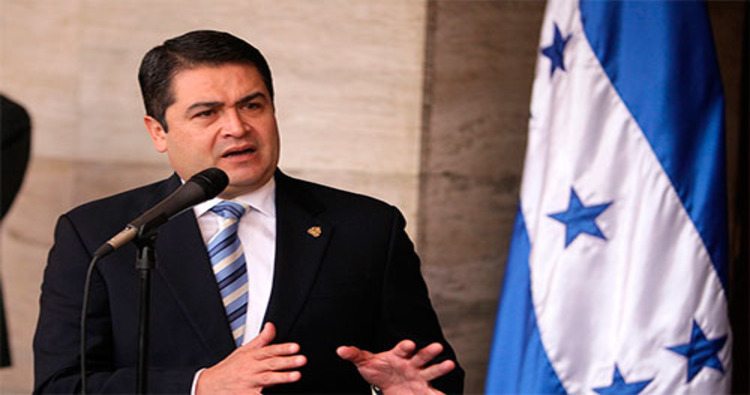Open For Business: Honduran President Orlando Hernández On Economic Development
By: Kelly Morrison and Alexander J. Preiss, Research Associates at the Council on Hemispheric Affairs
On June 12, Honduran President Juan Orlando Hernández arrived for his first visit to Washington since his election this January [1]. This morning, COHA Research Associates Alexander Preiss and Kelly Morrison attended his speech at the United States Chamber of Commerce, entitled “Honduras: Prospects for Economic and Social Change.” The Central American leader addressed strategies for economic development and the promotion of rule of law in Honduras.
Given the audience, Hernández’s speech brought few surprises. The President focused on the importance of private investment for Honduran economic development. He struck a tone of reassurance, attempting to convince the businesspeople in attendance that his administration’s policies provide a favorable investment climate despite the country’s rampant crime and insecurity. First, Hernández lauded the country’s Law for the Promotion and Protection of Investment, which was passed in 2011. [2] The law establishes clear rules of arbitration, provides a mechanism to ‘fast track’ large investments, and promises juridical stability for the enforcement of private sector contracts.
The President also shared his plan to create new Special Economic Development Zones (ZEDE) throughout the country. ZEDEs would follow a ‘charter city’ or ‘free city’ model, similar to Hong Kong and Iquique, Chile. The ZEDE initiative is a variation of preceding Honduran President Porfirio Lobo Sosa’s Special Development Regions (RED). The Honduran Supreme Court struck down the RED project in 2012 as unconstitutional due to its lack of transparency. Like RED, government backers argue that ZEDE would facilitate foreign investment and economic development. However, many analysts counter that such zones would only make the rich richer, perpetuate oligarchic rule, facilitate corruption, and inhibit true democracy. [3]
Hernández also mentioned his desire to create a canal seco (dry canal) connecting Amapala—which borders the Gulf of Fonseca on the Pacific Coast—with Puerto Castilla on the Atlantic coast. Hernández hopes that the creation of an alternative to the Panamá Canal will make Honduras an attractive location for investors as they create and transport goods and services. [4] However, he stuck to a rosy picture of the canal seco’s economic impact and avoided environmental, labor, and land rights issues. [5] The President also failed to mention how the canal seco would figure into the long-standing political power struggle over the Canal Zone.
In a departure from strictly economic matters, President Hernández concluded with a plea for help in the country’s seemingly interminable battle against drug trafficking and violence. As a drug transit country, the President argued, it is “unjust to leave us [Honduras] alone with a problem that we did not create.” Hernández implored the business community to “tell [its] Senate and [its] people that this is also your fight,” and that the “investment climate would be better with security.” “We are asking for your help,” he exhorted.
As a neoliberal president speaking before U.S. business leaders, Hernández’s panglossian portrayal of foreign investment and U.S. anti-drug strategies fulfilled expectations. However, for those hoping for a more comprehensive and equitable approach to economic development, his policies appeared to be little more than a stale rehash of the Washington Consensus.
Please accept this article as a free contribution from COHA, but if re-posting, please afford authorial and institutional attribution. Exclusive rights can be negotiated. For additional news and analysis on Latin America, please go to: LatinNews.com and Rights Action.
Sources:
[1] “El Presidente de Honduras es Esperado en Washington,” La Tribuna, June 12, 2014, accessed June 13, 2014, http://www.latribuna.hn/2014/06/12/el-presidente-de-honduras-es-esperado-en-washington/
[2]”Honduras: Promoción y Protección de la Inversión,” Central America Link, July 4, 2012, accessed June 13, 2014, http://www.centralamericalink.com/es/Legales/Honduras_promocion_y_proteccion_de_la_inversion/
[3]Arthur Phillips, “Charter Cities in Honduras?” Open Security, January 7, 2014, accessed June 13, 2014, http://www.opendemocracy.net/opensecurity/arthur-phillips/charter-cities-in-honduras
[4] “Se Acerca Construcción del Último Tramo del “Canal Seco’,” La Tribuna, February 14, 2014, accessed June 12, 2014, http://www.latribuna.hn/2014/02/14/se-acerca-construccion-del-ultimo-tramo-del-canal-seco/
[5] For a more in depth discussion of land rights issues in Honduras see: “Lower Aguan in Honduras and the Deadly Battle over Land Rights” https://coha.org/lower-aguan-in-honduras-and-the-deadly-battle-over-land-rights/


